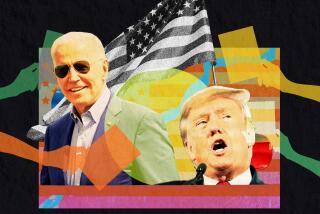Poll Says Puerto Ricans Are Split Over Statehood
- Share via
SAN JUAN, Puerto Rico — A day before their vote on whether to ask Congress to make this U.S. commonwealth the 51st state, Puerto Ricans were evenly split on the issue, a poll indicated Saturday.
But Gov. Pedro Rossello said he still expects the island to vote today to seek statehood.
“There are polls and there are polls,” Rossello said. “Most of them are not in agreement or consistent.”
Rossello, an ardent advocate of statehood, pushed hard to have the U.S. Caribbean island territory of 3.8 million people hold its third plebiscite on its relationship with the United States this year, its 100th year as a U.S. possession.
The poll, conducted for the San Juan Star newspaper, found that 47.6% of Puerto Ricans favored statehood. Among the four other options on today’s ballot, 47% picked “none of the above,” the one favored as a protest vote by backers of retaining commonwealth status. The poll had a 4-point margin of error.
The other options for today’s vote: remain a U.S. commonwealth, seek independence or begin a “free association,” which is quasi-independence with more power for the government and ties to the United States.
Commonwealth backers favor “none of the above” because of a dispute over the wording of the commonwealth option.
The opposition Popular Democratic Party maintains that remaining a commonwealth will keep Puerto Rico part of the United States without risking its language and national identity, which they fear they could lose with statehood.
Rossello, who leads the New Progressive Party, said the United States would accept a Spanish-speaking state, stressing that his administration promotes bilingual education.
An estimated 25% of Puerto Ricans speak English well.
Under commonwealth status, Puerto Ricans are U.S. citizens and receive many federal benefits. But they do not pay federal income taxes or vote in national elections.
Analysts have said the statehood option would need an overwhelming majority to win over a balky U.S. population, resistant to the idea of a Spanish-speaking U.S. state with a per capita income of about $8,000, less than a third of the average U.S. level of $25,660.
Puerto Rico has been a U.S. possession since Spain ceded it to the United States when it signed the Treaty of Paris on Dec. 10, 1898, ending the Spanish-American War.
More to Read
Sign up for Essential California
The most important California stories and recommendations in your inbox every morning.
You may occasionally receive promotional content from the Los Angeles Times.













